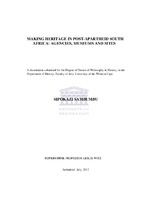| dc.description.abstract | This work responds to the perceptions of post-apartheid heritage practices as producing an
authorised heritage discourse. It contrasts this perception by approaching the making of postapartheid
heritage as not just a simple discourse, but as a broad and complicated network of
many meanings, knowledges, practices and approaches. These are generated and
disseminated through multiple disciplinary and practice inputs and outputs, and at different
levels and scales.
This work approaches these multiple intersecting points of heritage production and
reproductions as an intricate network, within and through processes of heritage making can
be seen as productive and unproductive. The focus of this work is in these different facets
that emerge as different role players navigate through intricate negotiations of meanings and
knowledges about pasts and presents. In this thesis, these workings are repeatedly identified
through the term complex, which I use to mean complicated, intricate or convoluted. The
analysis applies the term differently from the theoretical concept of complex, which refers to
the making of public national citizenry through a power/knowledge, rather than power and
knowledge discourse.
This work therefore investigates the complicated workings of heritage by means of
legislation, the complicated heritage governance by a council and agency, and the workings
of heritage through equally complicated operations of museums and sites. The investigation
involves focused ethnographic studies of the operations of the South African Heritage
Resources Agency, National Heritage Council, Nelson Mandela Museum, Ncome Monument
and Museum Complex, Freedom Park, and Robben Island Museum.
While this work might be theoretically associated within Critical Heritage Studies,
especially its recent preoccupation with the notion of authorised heritage discourse, it is framed against this concept. It argues that post-apartheid heritage is produced through
intricate negotiations occurring within entanglements, rather than through simple a
hegemonic discourse. It also argues that making heritage in post-apartheid South Africa
occurs within a wide network of multiple practices and approaches, rather than along
streamlined, simple deployments of dominant meanings and knowledges. | |

